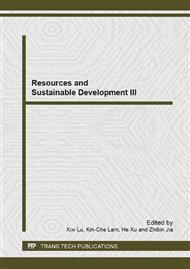p.1654
p.1660
p.1664
p.1670
p.1676
p.1680
p.1685
p.1690
p.1697
The Research on Establishing Monitoring Reporting Verification (MRV) of Carbon Emission in Hospitality
Abstract:
Recent years the hospitality in China has undergone a rapid growth, yet "high input, high consumption, high pollution" characteristics of hospitality have become a burden for future development. The prerequisite for energy saving and emission reduction in hospitality is to establish an effective energy consumption assessment system, which is suitable for the hospitality industry. Though the analysis of the data collected from the hotels in the eastern China, the paper establishes the frame of Monitoring Reporting Verification (MRV) and a multi-dimension comprehensive energy consumption assessment system. Then, the paper assesses the energy consumption of various hotels by using the Monitoring Reporting Verification (MRV) and draws a few conclusions, which provide firm foundations for carbon trading in hospitality and benefit energy saving and emission reduction.
Info:
Periodical:
Pages:
1676-1679
Citation:
Online since:
June 2014
Authors:
Keywords:
Price:
Сopyright:
© 2014 Trans Tech Publications Ltd. All Rights Reserved
Share:
Citation:


